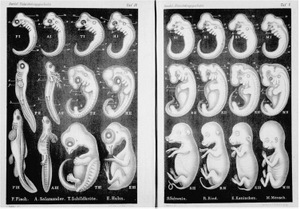The Foundation
Our Services
Interactive Resources
Displaying items by tag: forgiveness
They've Got the Wrong Gospel
A friend of mine recently shared an astounding fact. 90% of children who grow up in evangelical homes make a decision to follow Christ but only 22% of that group are still following Christ by age 35.
Before they are 35 years old, 80% of children who grew up in evangelical homes are not following Christ.
EIGHTY percent.
I had to check this out.
Truth Above All- Part 2
In part 1 of this series, we noted that Ernst Haeckel's inaccurate sketches of embryos in various stages of development from 1847 were still being used in public school textbooks as late as the early 2000's. In a similar fashion, certain ideas within Christianity that have been debunked by archaeologists, historians, and modern Biblical scholars also continue to be presented as truth to an unsuspecting audience.
The first error we addressed was an inaccurate view of first-century Judaism's teaching on salvation that was presented in a small booklet mentioned previously. A second error also had me shaking my head in disbelief.
Truth Above All- Part 1
 In 1847, Ernst Haeckel created sketches of embryos in various states of development and used them in his biology textbook entitled Anthropogenie. Modern science has proven these images to be inaccurate at best and outright fraud at worst.
In 1847, Ernst Haeckel created sketches of embryos in various states of development and used them in his biology textbook entitled Anthropogenie. Modern science has proven these images to be inaccurate at best and outright fraud at worst.
Although the images were debunked in the early 1900s, they were still being used in school textbooks as late as 2004 .
Christians who believe in the Biblical account of Creation point to continued use of Haeckel's images as proof that lies are being presented as evidence of evolution to unsuspecting public school students. They are demanding that it stop and their common chant is "Truth above all!"
Unfortunately, certain ideas within Christianity that have been debunked by archaeologists, historians, and modern Biblical scholars also continue to be presented as truth to an unsuspecting audience. We should follow the exhortation of Paul from 1 Thessalonians 5:21, "Put everything to the test. Hold on to what is good."
Red Suburban Man
Tuesday morning. 7:20AM.
Traffic is really backed up on the off-ramp today.
Cars take turns: one car exits and one car enters and one car exits— until Red Suburban Man.
I exit... well, try to exit.
Red Suburban Man wants to skip common courtesy and
HEY! YOU ALMOST RAN INTO MY NEW CAR, YOU JERK!
My new car honks to let Red Suburban Man know his social skills need improvement.
A window rolls down and Red Suburban Man gives me two small gifts: the bird and a loud "F--- YOU!"
Like a scene from The Matrix, time... slows... to a sudden... crawl...
Saying ‘I’m Sorry’
One of the ideas reiterated throughout this blog has been "words have power". One particular example that I often share with friends and family is the expression "I'm sorry".
I'm Sorry
In a literal sense saying "I'm sorry" means "I am wretched, worthless, poor."
Why would someone say such a thing? Aren't we created in the image of G-d? (Genesis 1:26)
This "wretched" meaning dates back to the 13th century and a time when people would debase themselves before some nobleman or leader as a result of some offense. They would essentially say "I am wretched, worthless, and poor" and seek the nobleman's mercy and favor.
In Memory of Carl Stephenson
WFT- grudging
Today is
Yom Shabbat, 19 Nisan, 5784 - Chag Hamatzah
Saturday, April 27, 2024
